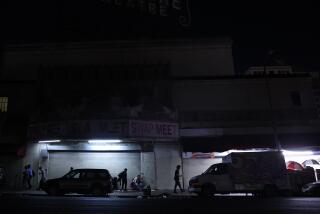PERSPECTIVES ON THE LAW : Resolved: Dangerous Gangs Should Be Banned From Parks : CON: ‘Preventive exclusion’ smacks of a police state. And who will be kept out--will it be based on looks?
The San Fernando City Council recently passed an ordinance that makes it illegal for a person who is a member of a gang to enter a popular city park.
We do not doubt the good intentions of the City Council. Violence in the park has made it unsafe for the many families and children who enjoyed going there. However, the council’s solution is both misguided and unconstitutional. Even worse, the endorsement of the council’s unconstitutional action by ambitious politicians and the press has encouraged other municipalities to consider similar ordinances. Before they do so, we must examine the practical and constitutional implications.
Respecting constitutional rights is not always easy. The quick-fix approach to crime has a surface appeal to all of us. But when glib solutions violate the Bill of Rights, we must resist them, uncomfortable or unpopular as that may be.
There can be no doubt that we need to make all of our parks safer for everyone. However, we can do that without sacrificing basic constitutional rights. If there is a serious problem in a particular park, police officers should be assigned to patrol that park during the hours it is open to the public. The presence of the police will do far more to deter criminal activity than the passage of any ordinance.
Putting a sufficient number of uniformed officers in Las Palmas Park is certainly a reasonable and necessary first step to alleviating the city’s problem.
The desire for security is something we all understand; the methods, however, can be wrong-headed. In our constitutional system, one principle has always been paramount: The end does not justify the use of unconstitutional means. In this case, San Fernando wants to address the problem of gang activity in the parks by banning individuals who belong to a so-called criminal street gang. However, no mechanism exists for determining what constitutes gang membership. Nor is there any procedure for deciding whether a particular group constitutes a criminal street gang. Will police merely exclude people who look as if they belong to a gang?
Under our system, we judge individuals by their individual actions, not by their association with a group, and certainly not by their association with a group that is itself not illegal. There is a fundamental lack of due process inherent in the San Fernando ordinance. Preventive exclusion, like preventive detention, smacks of a police state.
At best, the ordinance may succeed in exporting San Fernando’s gang problem to another park or another city for a while. But it will have no real deterrent effect. Anybody violating the ordinance is guilty of an infraction (similar to a traffic violation) and subject to a $250 fine. That will hardly scare off anyone bent on serious criminal conduct.
We are all familiar with occasions on which the desire for security has led us to disregard our Constitution. The exclusion of Japanese Americans from society during World War II was supported by Franklin D. Roosevelt and Earl Warren in the name of national security. From time to time, under the guise of solving crime and keeping society safe, police beatings and other abuses have been publicly countenanced. We have even imposed wholly improper and unwarranted limitations on free speech when false prophets cried “national emergency.”
At times, our Constitution may seem insensitive to the will of the majority. At other times, it may be inconvenient to follow its dictates. But the Bill of Rights has secured for us the type of free society that only Americans are privileged to enjoy. Still, our liberties are fragile and can be lost if we do not guard them carefully.
More to Read
Sign up for Essential California
The most important California stories and recommendations in your inbox every morning.
You may occasionally receive promotional content from the Los Angeles Times.










